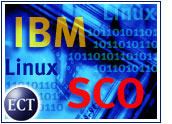
Lindon, Utah-based software company SCO has broadened its licensing attack against IBM by terminating a Sequent license on the same grounds it used as the basis for its earlier claims against IBM. SCO maintains that its Unix source code was used in Linux and therefore violates SCO’s rights.
SCO, suing IBM for billions in an intellectual property suit, has claimed that commercial Linux users are willing to pay for a license to continue using the open-source software. However, the company has drawn the ire of most open-source proponents as well as legal return fire from the likes of Linux distributor Red Hat. IBM, meanwhile, has filed a countersuit against SCO.
“The suit is obviously heating up with all sides upping the ante,” Yankee Group senior analyst Laura DiDio told TechNewsWorld. “Separately, each legal action is complex and confusing, and it could take years to resolve this.”
Source Code Claims
Similar to its claim that IBM used its Unix V source code in AIX, SCO now is claiming improper transfer of Sequent Unix source code and development methods in Linux.
Citing its contract with Sequent, which was acquired by IBM, SCO said the System V Software agreement included a prohibition against transfer of ownership and a restriction against third-party use.
IBM has rejected SCO’s claims, stating that its license is irrevocable and perpetual and calling SCO’s tactics an effort to create “fear, uncertainty and doubt.”
Software Specific
Meanwhile, SCO now has become more specific in its claims, stating, “Sequent-IBM has nevertheless contributed approximately 148 files of direct Sequent Unix code to the Linux 2.4 and 2.5 kernels, containing 168,276 lines of code.”
SCO said the Sequent code is critical multiprocessor code previously lacking in Linux.
In addition, Sequent-IBM also contributed significant Unix-based development methods to Linux, according to SCO, which claimed that “through these Linux contributions, Sequent-IBM failed to treat Dynix as part of the original System V software and exceeded the scope of permitted use under its Unix System V contract with SCO.”
License Police
SCO, which was called out over stock sales by company officers following the IBM suit, said that it gave IBM two months notice of the termination and that the move was “self-effectuating and does not require court approval.”
“IBM no longer has the right to use or license the Sequent Unix product known as Dynix/ptx,” said a SCO statement. “Customers may not acquire a license in Dynix/ptx from today’s date forward.”
Meanwhile, IBM said in a statement that SCO has yet to show any evidence that Big Blue has violated its agreements. While indicating faith that “the industry will resolve” the SCO suit in an earlier e-mail obtained by TechNewsWorld, IBM questioned the timing of SCO’s latest claims.
“IBM withdrew Dynix/ptx and associated Numa systems from the market long ago, long before the lawsuit was filed,” the statement said.
DiDio said SCO is simply widening the scope of its case to include high-end supercomputing environments — in which Dynix is deployed — in addition to the midlevel environments covered by its claims on IBM’s AIX.
“I don’t expect SCO is going to try and enforce this and yank out Dynix any more than they’re yanking AIX,” DiDio said. “It’s still a long shot. They’ve got an uphill battle, and the burden is on them. But they’re setting themselves up for a very big payday if they do win.”
Linux Licensees
SCO, which reported third-quarter income of US$3.1 million Thursday, also announced its first customer in its license program. It would say only that the licensee is a Fortune 500 company.
DiDio said some companies might find the SCO license more attractive than the possibility of litigation, but most will stand firm on resisting the license, which other analysts have called “nonsense,” at least until the case gets closer to trial next year.
“The legal posturing by all parties will have little impact on Linux deployment going ahead,” she said. However, she added that legal successes by SCO and lack of indemnification on Linux “could prove a boon to Linux rivals such as Microsoft Windows, HP-UX, Sun Solaris.”
Open Opposition
Despite SCO’s claim that it had contact with more than 300 companies in the first four days of its Linux license program, the Utah software company has become the top target of the open-source community.
SCO spokesperson Blake Stowell told TechNewsWorld that the company knew it risked both legal retaliation from Linux backers, such as Red Hat, and outrage from the open-source community when it filed suit in the first place.
“You really have a choice,” Stowell said. “You can stand up and do something about code that has been mishandled by the open-source community, or you can let them roll you over. We chose to stand up and fight.”





















































